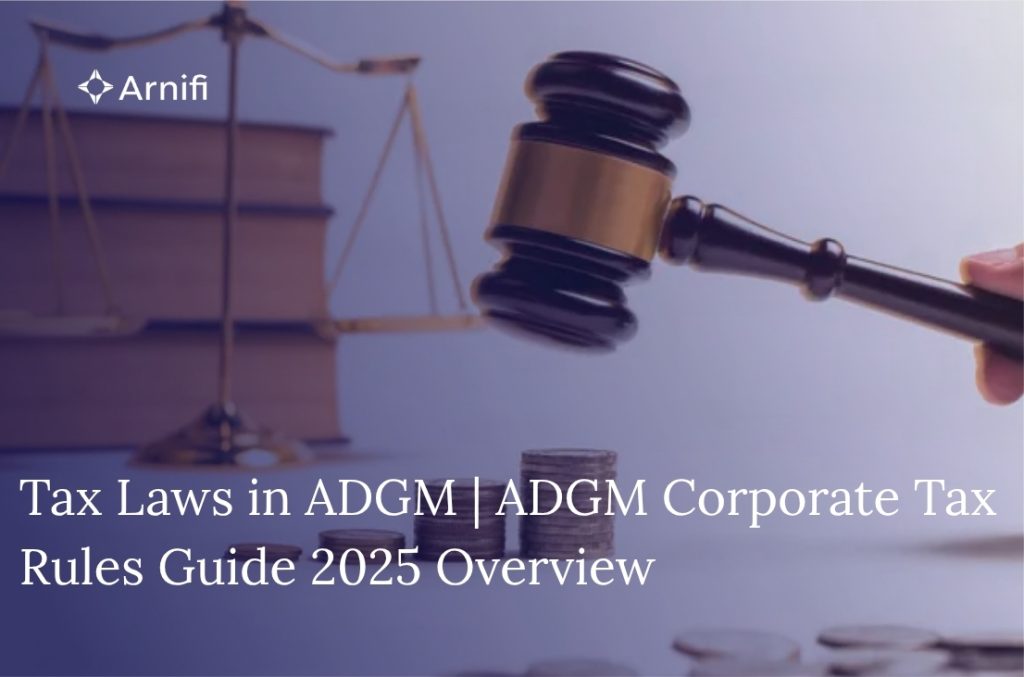Tax Laws in ADGM for Investors and Global Companies for 2025
by Rifa S Laskar Nov 19, 2025  8 MIN READ
8 MIN READ

Abu Dhabi Global Market (ADGM) is a financial free zone with its own courts and regulator. Federal taxes such as VAT and corporate tax are administered by the UAE’s Federal Tax Authority.
Entities incorporated or registered in ADGM follow the national tax laws, with special free-zone features. These can lower the corporate-tax burden when qualifying conditions are met.
Since 1 June 2023, UAE corporate tax usually applies at 9% when taxable profits go above AED 375,000, and a standard 5% VAT rate still covers most goods and services in the country.
By mid-2025, ADGM reported 2,972 active companies and a 42% jump in assets under management year on year, which shows how important these tax rules have become for investors and global groups.
Table of contents
- What Are the Tax Laws in ADGM and Free Zones?
- Qualifying vs Non-Qualifying Activities For Free Zone Tax
- Mainland Dealings and Non-Free-Zone Counterparties
- How QFZP Rules Apply to Funds and SPVs?
- What Are The VAT Rules in ADGM?
- What is Transfer Pricing (TP)?
- How Does Economic Substance Regulations (ESR) Work?
- Compliance Calendar (ADGM Entities Using a 31 Dec Year-End)
- Records Global Investors Must Keep
- Tips for Banking and Treaties
- Practical Setup for New Entrants in ADGM
- Conclusion
- FAQs
What Are the Tax Laws in ADGM and Free Zones?
The UAE corporate tax regime applies to ADGM entities. A free-zone person can also be treated as a Qualifying Free Zone Person (QFZP) and be taxed at 0% on qualifying income and at 9% on non-qualifying income.
To keep QFZP status across years, an entity typically needs to:
- Maintain adequate substance in the free zone (people, functions, and assets).
- Earn qualifying income and remain within the de-minimis limit for non-qualifying income.
- Comply with transfer pricing and maintain contemporaneous documentation.
- Prepare audited financial statements and file returns on time.
Important Advice: Loss of any condition can switch the entity to the normal regime (9% on taxable income) and, in some cases, lock out the 0% treatment for a multi-year period.
Qualifying vs Non-Qualifying Activities For Free Zone Tax
Qualifying activities:
- Holding of shares and other securities
- Headquarters services to group entities
- Treasury and intra-group financing
- Fund, asset, and wealth management
- Ownership or operation of ships
- Financing and leasing of aircraft
- Distribution of goods via a designated zone
- Logistics services
- Ancillary activity integral to any qualifying line
Excluded activities typically taxed at 9%:
- Income linked to immovable property in the UAE
- Certain services supplied to natural persons
- Specified non-qualifying financial services
Mainland Dealings and Non-Free-Zone Counterparties
Income earned by a QFZP from transactions with non-free-zone persons is commonly treated as non-qualifying unless very specific conditions are met.
A good example is: certain designated-zone goods activities, where the supplier and customer both meet strict customs and movement conditions.
Important Advice: Contract scoping, billing chains, and permanent-establishment risk in the mainland should be reviewed before signing long-term service or IP agreements.
How QFZP Rules Apply to Funds and SPVs?
ADGM hosts a large population of SPVs, holding companies, captive finance vehicles, and investment funds. Here are three recurring patterns:
- Pure holding SPVs that only own shares/securities can often align with qualifying activity when substance and documentation are in place.
- Group finance SPVs must evidence decision-making, risk control, and pricing to meet both QFZP and transfer-pricing expectations.
- Investment funds may seek exempt status if they satisfy the regulatory and ownership tests. Portfolio companies still apply the standard/QFZP logic.
What Are The VAT Rules in ADGM?
ADGM is not listed as a VAT Designated Zone under Cabinet Decision No. 59 of 2017 and its later updates.
Normal UAE VAT rules apply in ADGM. The standard rate is 5% on most domestic supplies of goods and services, a zero rate can apply on qualifying exports, and specific financial services can fall under VAT exemption.
The FTA’s Financial Services VAT Guide expects clear mapping of income streams, and documented partial exemption methods for input-tax recovery.
What is Transfer Pricing (TP)?
Transfer pricing (TP) is the price set for goods, services, financing, or intangibles when they move between related companies in the same group, such as a parent and its subsidiary.
Tax rules require these intra-group deals to follow the arm’s length principle. In simple terms, the terms and prices should match what independent parties would accept in a similar deal under similar conditions, so that profits are not shifted artificially between countries or entities.
How Does Economic Substance Regulations (ESR) Work?
Economic Substance Regulations (ESR) apply to UAE entities that carry on a relevant activity such as holding company, headquarters, financing, fund management, distribution and service centre, IP, or shipping.
Companies must:
- Show that CIGA takes place in the UAE.
- Hold board meetings locally.
- Maintain adequate employees and premises.
- Record operating spend in the jurisdiction.
- File an ESR notification each year and, when required, an ESR return with supporting schedules.
Important Advice: Keep payroll and visa records, tenancy or service contracts, plus cost ledgers. Align ESR evidence with any QFZP substance file. Weak ESR can trigger penalties (AED 50,000 as the first penalty, which goes up to AED 400,000 for repeated violations).
Compliance Calendar (ADGM Entities Using a 31 Dec Year-End)
- ADGM Corporate tax return & payment: typically due 9 months after period end.
- Financial statements: audited annually; QFZPs should keep signed audits ready before filing.
- TP documentation: contemporaneous, retained; disclosure filed with the return as required.
- VAT: returns per assigned period (often quarterly or monthly) with payment within the standard deadline.
- ESR: notification and annual return per MoF timeline.
- KYC/AML: sector-specific obligations via FSRA and ADGM Registration Authority.
Records Global Investors Must Keep
A durable archive cuts audit time and protects the 0% position:
- Organizational charts, board resolutions, and evidence that strategic decisions occur in ADGM.
- Employment contracts or service agreements showing people and premises in the free zone.
- Intercompany agreements for HQ, financing, and IP; pricing memos and benchmarking.
- Segregated ledgers that split qualifying vs non-qualifying income and track any de-minimis testing.
- VAT evidence: tax invoices, reverse-charge journals, import/export proofs, and reconciled control accounts.
- ESR files: CIGA logs, meeting minutes, and cost/employee records.
Tips for Banking and Treaties
UAE withholding tax is 0%, but foreign payers may apply their own withholding unless treaty paperwork is in place. ADGM entities that receive dividends, interest, or royalties should maintain UAE Tax Residency Certificates, beneficial-owner statements, and destination-country forms to unlock treaty rates and avoid cash leaks.
Practical Setup for New Entrants in ADGM
- Choose an entity type (SPV, holding, fund manager, advisory, finance vehicle) aligned to the intended activity.
- Fix the governance rhythm: quarterly board meetings in ADGM, local signatories, and premises that match headcount.
- Build the ledger map on day one: separate revenue/cost streams so qualifying vs non-qualifying tests run automatically.
- Lock intercompany documentation and pricing before funds flow.
- Align VAT codes, ESR notifications, and corporate-tax registration early to avoid catch-up filings.
Conclusion
Abu Dhabi Global Market laws ensure the platform remains sophisticated for cross-border investors, but the tax result rests on structure, substance, and documentation rather than location alone.
Clear contracts, audited accounts, and year-round testing of qualifying income keep the 0% promise real while minimizing 9% leakage and review friction.
Taxation policy is UAE highly supports businesses, and it can prove to be a great advantage. However, companies must fulfil the exact tax criteria to avoid risks of penalties.
Feeling confused where to begin? Hire Arnifi’s expert accounting and bookkeeping services. We coordinate, structure, substance, and evidence into a single, audit-ready file that holds under scrutiny.
FAQs
What are the tax laws in ADGM?
Federal UAE tax laws apply in ADGM: the corporate-tax regime (with 0%/9% outcomes depending on QFZP status and income type), VAT at the federal level, transfer-pricing rules for related-party dealings, and Economic Substance Regulations for relevant activities. Local ADGM rules continue to govern company law, regulation, AML/KYC, and court matters.
How does ADGM interact with mainland customers?
A QFZP can earn 0% on qualifying income; amounts that fall outside the qualifying set (or fail de-minimis) are taxed at 9%. Contracts with mainland counterparties should be scoped carefully. This helps avoid turning qualifying income into non-qualifying income or creating a mainland permanent establishment.
Are ADGM SPVs automatically at 0%?
No. Status depends on meeting QFZP conditions, substance, and income tests each year. A holding-only SPV may qualify; mixed activities or excluded income push amounts into the 9% bucket.
Do investment funds pay corporate tax?
A Qualifying Investment Fund can be exempt if it passes the legal and regulatory tests. Portfolio companies are taxed under their own regimes.
Does ADGM change VAT rules?
No. ADGM is not a designated zone for VAT; standard federal VAT rules apply to supplies, exports, imports, and reverse-charge services.
Top UAE Packages

Related Articles
Top UAE Packages



